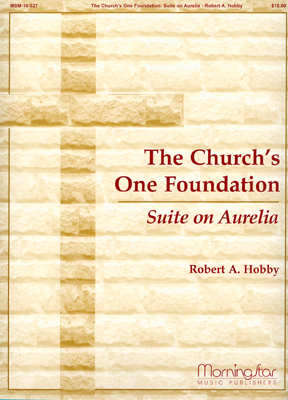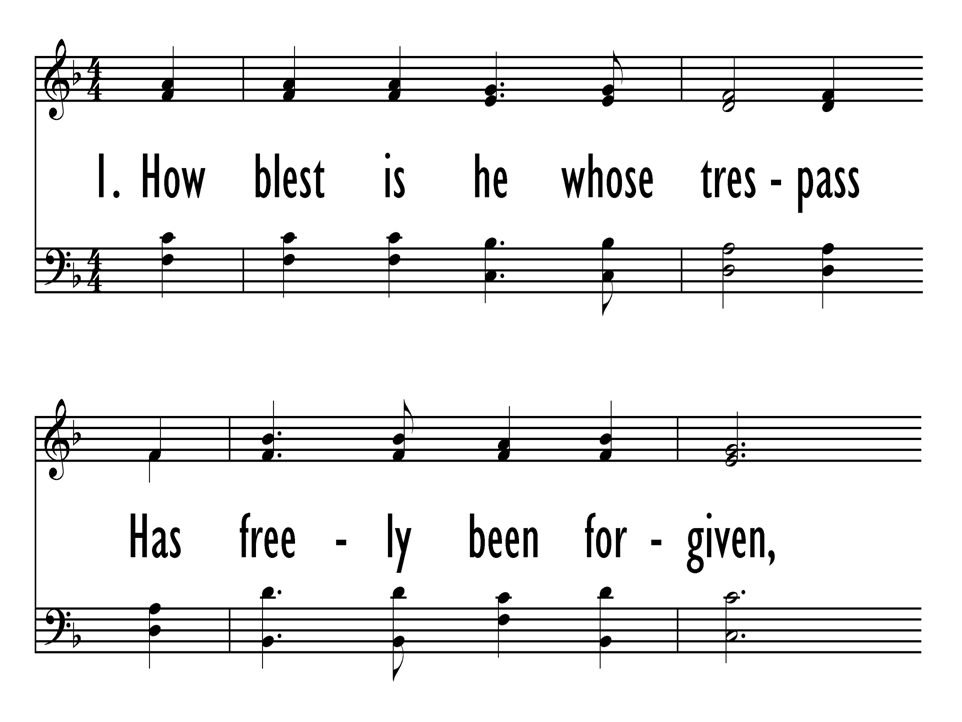- |
User Links
How Blest Is He Whose Trespass

How blest is he whose trespass Has freely been forgiven
Published in 31 hymnalsPrintable scores: PDF, MusicXMLPlayable presentation: Lyrics only, lyrics + musicAudio files: MIDI, Recording
Representative Text
1 How blest is He whose trespass
hath freely been forgiv'n,
whose sin is wholly covered
before the sight of heav'n.
to whom the LORD in mercy
imputeth not his sin,
who hath a guileless spirit,
whose heart is true within.
2 While I kept guilty silence,
my strength was spent with grief;
Thy hand was heavy on me,
my soul found no relief;
but when I owned my trespass,
my sin hid not from Thee,
when I confessed transgression,
then Thou forgavest me.
3 So let the godly seek Thee
in times when Thou art near;
no whelming floods shall reach them,
nor cause their hearts to fear.
In Thee, O LORD, I hide me;
Thou savest me from ill,
and songs of Thy salvation
my heart with rapture thrill.
Source: Psalms and Hymns to the Living God #32
Text Information
Related Texts
| First Line: | How blest is he whose trespass Has freely been forgiven |
| Title: | How Blest Is He Whose Trespass |
| Meter: | 7.6.7.6 D |
| Language: | English |
| Copyright: | Public Domain |
- Year A, Lent, First Sunday
This is recommended for Year A, Lent, First Sunday by 2 hymnal lectionary indexes including Glory to God: the Presbyterian Hymnal #446 and Lift Up Your Hearts: psalms, hymns, and spiritual songs #669.
English
- Bible Songs No. 4: a selection of psalms set to music, for use in sabbath schools, adult Bible classes, young people's societies, prayer meetings, evangelistic services, and family worship (4th ed.) #73
- Bible Songs No. 4: a selection of psalms set to music, for use in sabbath schools, adult Bible classes, young people's societies, prayer meetings, evangelistic services, and family worship (4th ed.) #71
- Bible Songs No. 4: a selection of psalms set to music, for use in sabbath schools, adult Bible classes, young people's societies, prayer meetings, evangelistic services, and family worship (4th ed.) #74
- Bible Songs No. 4: a selection of psalms set to music, for use in sabbath schools, adult Bible classes, young people's societies, prayer meetings, evangelistic services, and family worship (4th ed.) #72
- Bible Songs No. 4: a selection of psalms set to music, for use in sabbath schools, adult Bible classes, young people's societies, prayer meetings, evangelistic services, and family worship (4th ed.) #70
- Bible Songs: a collection of psalms set to music for use in church and evangelistic services, prayer meetings, Sabbath schools, young people's societies, and family worship (Rev. and enl.ed) #66
- Bible Songs: a Selection of Psalms Set to Music for Use in Sabbath Schools, Adult Bible Classes ... 7th ed. #d42
- Crescent Service Program No. 13 #d10
- Glory to God: the Presbyterian Hymnal #446
- Hymns to the Living God #89 10 shown out of 27
Spanish
Notes
A testimony to the blessedness of the forgiven and an exhortation to the trust, obedience, and joyful worship that should mark their lives.
Scripture References:
st. 1 =vv. 1-2
st. 2 =vv. 3-5
st. 3 = vv. 6-7
st. 4 = vv. 8-9
st. 5 =vv. 10-11
Psalm 32 is traditionally considered a penitential psalm (along with 6, 38, 51,102, 130, and 143). In the sequence of spiritual experience it follows the situation depicted in Psalm 51, the great plea for forgiveness. That psalm's traditional association with David's sin against Uriah, together with Psalm 32's reference to delayed confession, has suggested a historical link between the two. The psalm's thematic movement is noteworthy and is well represented in the versification, which is slightly altered from that of the 1912 Psalter.
The psalm begins with a testimony to the blessedness of those forgiven by God (st. 1). Retracing the spiritual movement from stubbornly denying sin to experiencing the joy of God's forgiveness (st. 2), the psalm exhorts all the godly to faithfully rely on God and reaffirms the LORD as refuge and hiding place (st. 3). Next God speaks, instructing the saints in godly obedience (st. 4). The psalm then contrasts the lot of the wicked with that of those who trust in God, and it closes with a call to the righteous to rejoice in God for his unfailing mercies (st. 5).
Liturgical Use
Though considered penitential, this psalm is properly used not so much in confession of sin as in thanksgiving for God's forgiveness of our sin. It is a joyful psalm! Within that context, the psalm could also serve as a call to confession (st. 1-3) and instruction for godly living following the assurance of pardon (st. 4-5).
--Psalter Hymnal Handbook


 My Starred Hymns
My Starred Hymns





